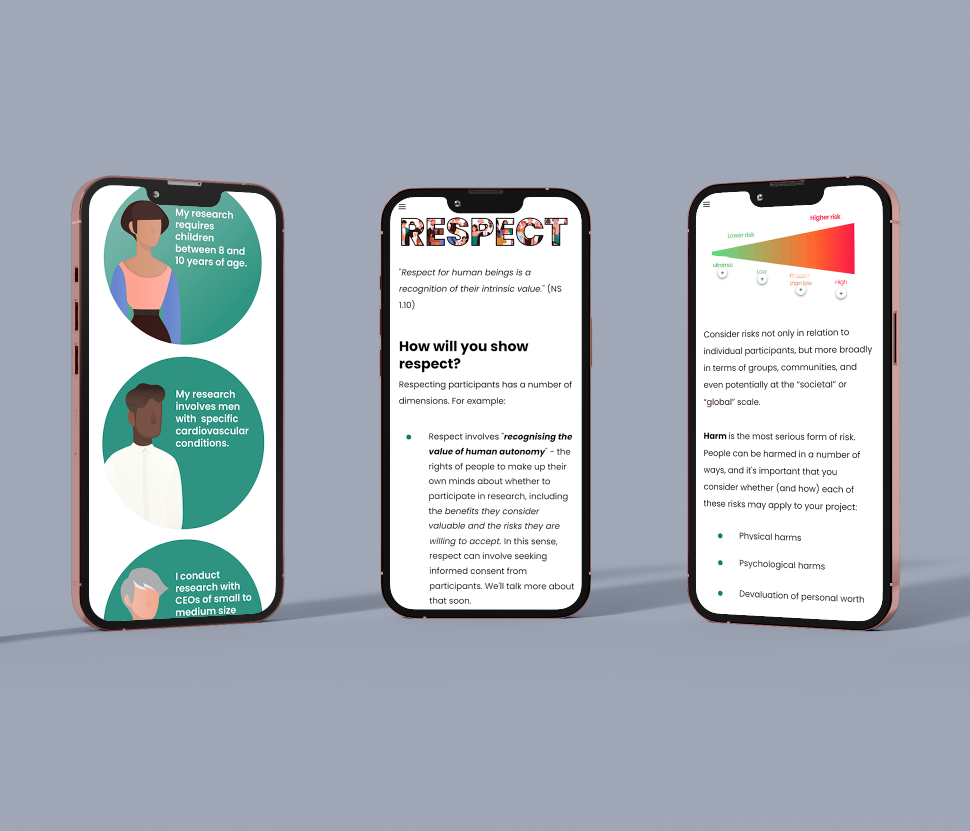Introduction to Human Research Ethics
Practically, this course helps researchers submit quality human research ethics applications. More fundamentally, it helps academics and students reflect on how they can design, conduct, and report their research in an ethical way.
Engaging research ethics training
Human research ethics involves complex considerations, and applying for ethics approval can be challenging, especially for research students.
This course will help.
We break down difficult topics into clear activities and engaging multimedia.
We help researchers apply ethical principles and risk mitigation strategies to their own projects and explain how to write a quality ethics application.
Designed for researchers
Introduction to Human Research Ethics makes responsibilities clear. It's designed for busy academics and research students.
Content is delivered as snappy videos, concise conversational text, meaningful interactions, and optional activities for learners with particular areas of interest.
The content draws deeply from the research literature and provides a framework for approaching tricky ethical issues.
Participant focused
One of the most important tasks of human research ethics is to consider a project from the perspective of participants. This can be challenging, especially where participant cohorts are diverse or have specific needs, or where researchers are working with data that seems far removed from the people whose data they are.
This course helps researchers design their projects with participants in mind.
-
Help supervisors help students
Supervisors have a responsibility to help their research students apply for ethics approval, but that’s hard to do! Our resources help supervisors help students.

-
Discussion primer
Our one-page discussion primer makes it easier for students and supervisors to discuss key ethical considerations during the design phase of a research project.

Research Ethics Manager of a large university
“The tone is just right. We love the clear, simple language.”
Human Research Ethics Committee member
“I think it will have long-term benefit for the University’s research output.”
Assess learning and track completions
There are interactive ‘knowledge checks’ throughout the course, and a short quiz at the end. The quiz tests the genuine application of knowledge.
When a user passes the quiz, the results are ‘sent’ to your Learning Management System so that you can easily track your staff and student completions.
FAQs
-
We value researchers' time. The core content takes most researchers less than an hour to complete, although they can complete the course at their own pace, and come back to it later.
There are many optional resources to explore topics in more detail, and researchers can dip in and out, as they please.
-
For sure!
If you manage research ethics for a research institution, contact us and we'll hook you up.
-
If your institution has a Learning Management System — a system that hosts online training for staff and students — this course will almost certainly work for you. We can provide a test package so you can be sure it works before you commit.
Using your own systems helps you keep your learner data secure, and provides a consistency with your other training offerings.
The course runs on desktop, laptop, tablet, mobile, etc.
-
Since our launch in 2023, Tricky Goose courses have been successfully implemented by leading universities and research institutes in Australia and the UK. In mid 2024 we also expanded into other regions.
Almost all of our business has spread by word of mouth. If you'd like to hear from happy customers, we'd be glad to put you in touch.
-
Yes. This course has been designed and assessed in relation to the Web Content Accessibility Guidelines (WCAG) 2.1: Level A and Level AA.
-
We offer this course to research institutions under a license agreement, usually for a period of two years. A license grants unlimited use by staff and students for the license period, and includes our unique customisation package.
Contact us to discuss fees and how this course could be specially customised to suit your needs.







